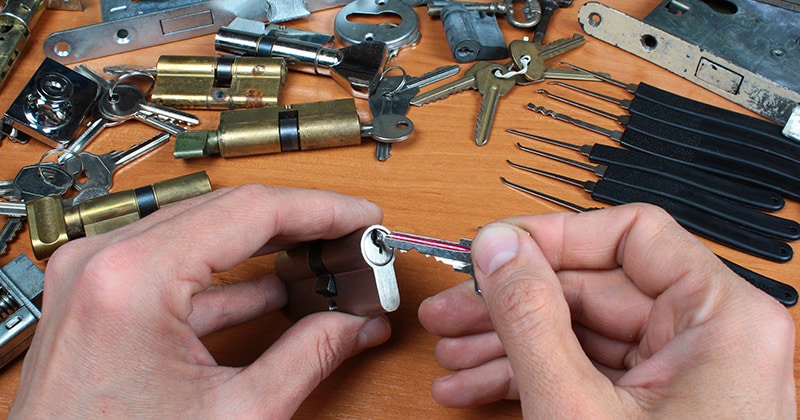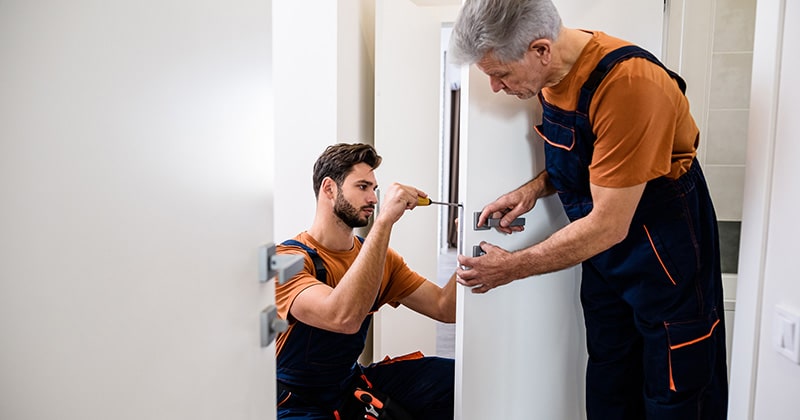
Do you need a license to be a locksmith? It might surprise you to learn that you do in many US states.
In this blog post, learn about the different licensing requirements for locksmiths and the steps for getting a license. Get tips you can use today when starting to apply for your license.
This extra layer of credentialing presents some additional work. However, as you’ll read below, it also offers many benefits that can help acquire customers. It also lets you increase revenue for greater profits and build your business.
Licensing Requirements for Locksmiths
Whether or not you need a license as a locksmith depends on where you live and operate. As of 2022, 13 states require licensing. It used to be 15, but Tennessee and Nebraska no longer have this requirement.
States That Require Locksmith Licenses
If you have a locksmith business in one of these states, you’ll have to get licensed:
- Alabama
- California
- Connecticut
- Illinois
- Louisiana
- Maryland
- Nevada
- New Jersey
- North Carolina
- Oklahoma
- Oregon
- Texas
- Virginia
In Maryland, licenses are required for businesses, not individuals.
What if you practice in two neighboring states, like California and Oregon or Nevada? You should have a license for each state, which has different requirements.
Some states exempt certain activities related to locksmithing from licensing requirements. These exemptions can include:
- Making duplicate keys (like most hardware stores do)
- Modifying locks in a way that the manufacturer intended users to do
- Repairing automotive locks as a mechanic or auto dealer
- Installing new locks on construction that requires a building permit
- Installing replacement locks as a security systems technician
- Rekeying locks on rental properties as a landlord or property manager
- Performing sales demonstrations of lock and locksmithing equipment
If you’re not sure if you need a license, it’s recommended that you check. Never assume you don’t need a license for your locksmithing work.
Different agencies handle locksmith licensing based on the state. These include:
- Electronic Security Board of Licensure (AESBL)
- Contractors’ State License Board
- Department of Consumer Protection
- Office of the State Fire Marshal
- Department of Labor
- Department of Public Safety
- Department of Criminal Justice Services
Stay Current with Locksmith and Other Licensing Requirements
Be aware that licensing requirements can change over time. Although some states may drop their mandates, others may enact new locksmith regulations. It’s best to check with your state government yearly to see if anything has changed.
Local laws regulate locksmith businesses in multiple places in the United States. Therefore, it is smart to ask your city or county government about any regional requirements before starting work as a locksmith.
For example, Florida does not require a state license for locksmiths. But if you work in Miami-Dade County, you do need a license.
Say you want to open your own commercial locksmith shop in a state or city without a license requirement. Don’t forget you may still have regular business licensing regulations to follow, which apply to all area businesses.
RELATED ARTICLE: How to Become a Locksmith and Jumpstart Your Business
Locksmith Licensing: A Look at Some Typical Requirements
What can you expect to encounter if you apply for a locksmith license? Here are some common requirements for locksmiths in various states:
- Proof of liability insurance
- Photo identification
- Passport-style photos for your future license
- State and federal background checks
- Proof of ability to work in the United States
- Completion of a locksmith training course
- Passing a locksmith certification test
- Experience as an apprentice or assistant locksmith
- Sheriff’s permit, at the discretion of the sheriff’s office
Not every state requires all of these. However, you’ll likely have to check off three or four items no matter where you operate.
You must be at least 18 years old and have a high school diploma, at minimum, in most states that require a locksmith license. Also, expect to pay one or more fees to apply for your license. Some states charge for the application plus your background check or fingerprinting.
Each State Is a Little Different
There are states like Louisiana that have specific locksmith licenses for different activities:
- Security
- Electronic locking systems
- Banking
- Detention
- Door hardware consulting
Others, like Oregon, require you to have an additional license with an associated licensing entity. In Oregon, that’s the Oregon Construction Contractors Board (CCB).
Virginia lets you work for 90 consecutive days while you get your locksmith training or wait for your license to be processed.
In Pennsylvania, which is not on the list above, you don’t need to be licensed as a locksmith. However, you must have a Home Improvement Contractor’s license if you make more than $5,000 per year as a locksmith. New York City and Nassau County, New York, have similar laws.

Benefits of Licensing for Locksmiths
Legal compliance is just one reason to ensure you get a locksmith license if required. You don’t want to receive citations or fines for noncompliance. Worse, your business and source of income could be shut down for breaking the law.
Staying Out of Trouble with the Law
In certain states, it is illegal to carry lock-picking tools if you are not a licensed locksmith. Let’s say you were caught using these tools on the job. You were helping a customer get into their house after they locked the door with the keys inside.
But a local police officer driving by thought you were trying to break into the house. You could be detained and even charged if you can’t prove you’re a licensed locksmith.
Credibility with Clients
Holding a locksmith license also gives you credibility with clients and makes you appear more trustworthy. They know you have the knowledge to get the job done right.
And they see you have passed a background check, so you’re not a criminal. This is essential if you’re working on locks for homes and businesses. Those locks are intended to keep the occupants and their property safe and secure.
Think about it as a consumer yourself. You wouldn’t hire a lawyer who hadn’t passed the bar exam, right? Nor would you want your hair cut by someone who wasn’t adequately trained as a stylist or barber.
Liability Insurance for Emergencies
Above, you read that many states require liability insurance for locksmiths. This protects both you and your clients if an emergency happens.
Imagine you install locks for a homeowner but make a mistake because you were tired or distracted. Later that night, the home is robbed because the front door lock failed. The door blew open in the wind while the owners were at dinner. Your liability insurance would cover this scenario rather than paying out of your own pocket.
There are lots of other hazards covered by liability insurance, such as:
- Injuries or accidents to non-employees while you’re performing a job
- Damage to a client’s property, such as chipping or scratching a door
- Harm resulting from false or incorrect advertising of your services
Even if liability insurance isn’t required as part of your state license, you would be wise to purchase it anyway. It’s one more way you can improve your credibility with potential customers.
If you live in a state that doesn’t require locksmith licensing, you may be looking for ways to stand out from the competition. Carrying appropriate business insurance is one strategy.
Completing locksmith training and enrolling in continuing education is another solid tactic. When combined with experience, it tells clients you take your business seriously. You’re willing to go above and beyond what your state mandates.

How Training and Certificates Impact Earnings
In the previous section, you learned how training and meeting state requirements put customers at ease. These extra efforts can also reward you when it comes to earnings. There are over 24,000 locksmith businesses in the United States. The industry took a dip during the Covid-19 pandemic. But overall, growth is predicted for this field. That means you need to stay competitive, whether you’re applying for a locksmith job or thinking of opening your own shop. One of the best ways to do that is to get as much training as possible and obtain your license. Locksmith training and continuing education lets you stay on top of new trends like:
- Smart locks and keyless entry
- Security systems and alarms
- Integrated infrastructure
- Conventional lock technology
- Innovative products and equipment
Understanding these topics and more can make you a competitive job candidate. And they can be essential to earning top dollar in the industry.
Customers want the best locksmith because their home or business security depends on it. When you have a great deal of training under your belt, you can market yourself more aggressively. You should be able to attract more customers based on your knowledge.
You could also specialize in one or two areas of the locksmith trade and open your own company. For example, you could focus on high-tech security and keyless entry. This is also an ideal specialty if you want to partner with security companies for more business.
RELATED ARTICLE: How Field Service Technician Software Ups Your Game as a Service Provider
Steps to Obtain a Locksmith License
Obtaining your locksmith license will be easier if you approach it methodically. Follow the steps below, keeping in mind that you may have to reorder some of them depending on your state’s process:
- Find out which agency governs locksmith licensing for your state or city. See what their licensing requirements are and write them down/print them off.
- Sign up for locksmith training and take any examinations from your institution.
- Apply for your criminal background check and pay the related fee.
- Take any further tests required by your location and purchase liability insurance.
- Get the necessary license photos taken, apply for your license, and pay the fee.
Be sure to ask if you’re allowed to work while you wait for your license to be approved. You may have to wait until it arrives before you can make money as a locksmith.

Renewal and Compliance Considerations
As with everything else related to locksmith licenses, the length of your license (when it expires) will vary with your state. You must find out when you get your license and how long it’s good for.
Then, before the license expires, you’ll want to go through the renewal process. This will ensure there are no gaps in licensing that would mean you can’t operate. Not being able to work while you wait to renew your license would mean a severe drop in income.
Here are a few top tips regarding license renewal and compliance:
- Keep up to date with requirements and changes in your field.
- Make sure the state has your proper mailing address for renewal reminders.
- Don’t forget to renew any required insurance policies for your license.
- Check with your state about any licensing requirements if you change employers, open your own business, or add employees as an owner.
- Keep your nose clean with the law; even a misdemeanor could keep you from getting your license renewed.
Getting Your Locksmith License: Where to Start
Ready to get started on the process of getting your locksmith license? Here are a few final suggestions to make it go as smoothly as possible:
- Talk to locksmiths in your area about licensing requirements and training opportunities. They can make recommendations and may even know of available jobs.
- Do you live in California? As an individual, you will have to name your employer on your license application. So, start job hunting as you work through the rest of your list.
- Know what’s on your background check. That way, if anything unusual surfaces due to an error or ID theft, you’ll immediately recognize it.
- The more complicated your background check, the more time you will need to give it. Some states, like Connecticut, obtain criminal history reports from both the state police and the FBI.
- Shop around for liability insurance. Different carriers offer various amounts of coverage and terms. You can usually save money by bundling your insurance with the same agent or company that provides your home and auto insurance.
- If you plan to open your own locksmith business, explore other kinds of business insurance. You’ll want workers’ compensation, commercial auto, and property insurance for your equipment.
- Stay on top of any other requirements that aren’t technically licensing, but you will need them anyway. One of the main ones is having a valid driver’s license.
RELATED ARTICLE: Locksmith Invoice Template + 5 Invoicing Tips and Tricks
Related Posts
Stay Informed
Get the latest news and insights plus, Service Fusion offers and updates.Thank you for your submission.
SHARE